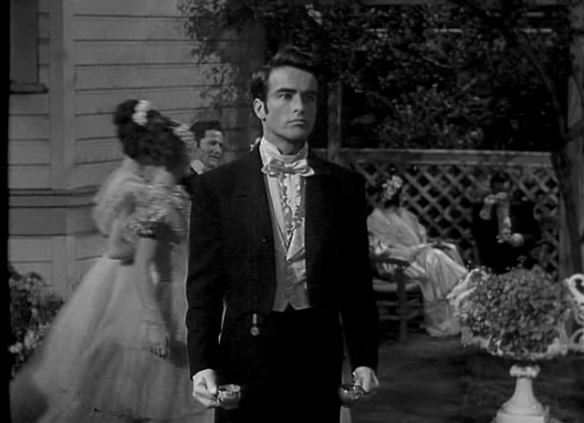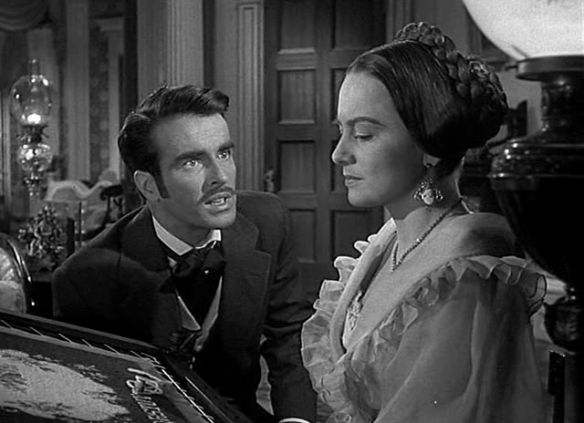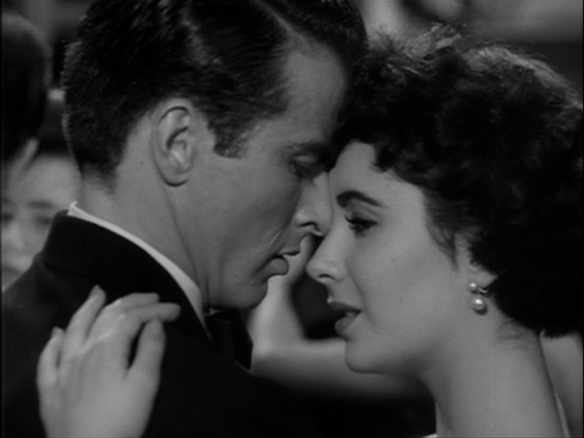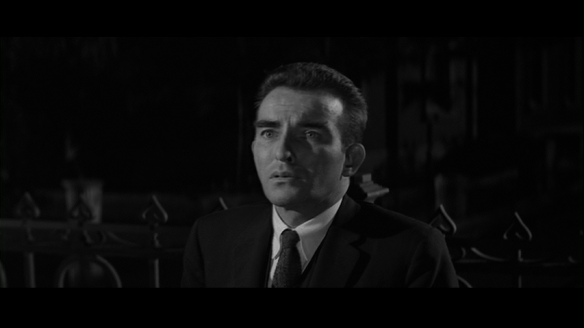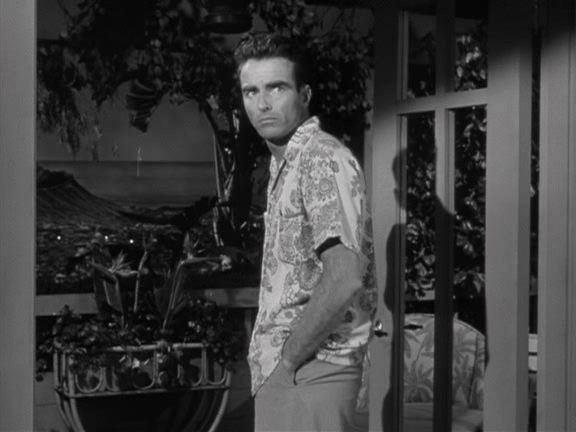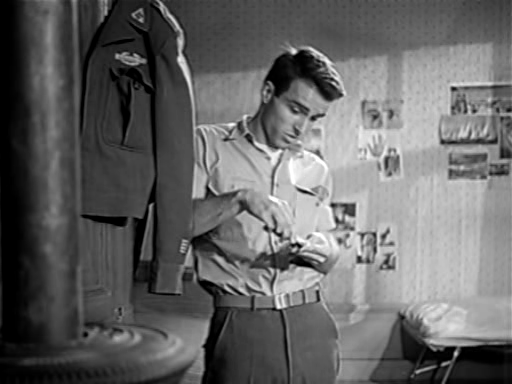The Oscars are next week and just to give you an indication of how incredibly vacuous and self-congratulatory the ceremony will be, George Clooney is nominated for Best Actor. I mean, it’s not exactly Marlon Brando for The Godfather, is it?
Once upon a time, though, Montgomery Clift was nominated for an Oscar. Four times. He never won–unjustly so–but his performances inspired countless actors: Brando, Dean, Pacino, de Niro. And on and on. He did not die young, an immortal idol like James Dean; he died at home quietly, alone, aged 45. He did not remain an enduring film star like Cary Grant or John Wayne, dying with just seventeen films to his name. And so he is often forgotten–but only by those who have never witnessed one of his indelible performances, each one marked by his exceptional talent, vulnerability, and intensity.
This list could easily encompass all his films because Montgomery Clift never committed a mediocre performance to film. But here they are–my five favorite Montgomery Clift performances.
Honorable Mention: Judgment at Nuremberg (Stanley Kramer, 1961)
“I want that you tell me was she feeble-minded? My Mother! Was she feeble-minded? Was she?!”
OK, so I fibbed a bit. There’s six films on this list. Five was just way too constrictive.
Clift appears in a mere seventeen minutes of Stanley Kramer’s 186-minute film about four judges who executed Nazi sterilization and “cleansing” policies. The film boasts an all-star cast, including Marlene Dietrich, Judy Garland, Burt Lancaster, and Spencer Tracy, but Clift’s performance eclipses them all. He portrays a sterilized Jewish man, Rudolph Peterson, who claims the Nazis sterilized him because of his family’s political affiliations. During cross-examination, however, the defense alleges the reason for his sterilization was his genetic “feeble-mindedness.” Peterson’s vigorous, heart-wrenching reaction to the charge is unforgettable, as he holds up a photograph of his mother and asks the court if she was feeble-minded.
Clift struggled to remember his lines; Spencer Tracy reportedly told Clift to play the scene to him, and that is the take that appears on film. Director Stanley Kramer states that he instructed Clift to ad lib, a way to convey the character’s confusion, and that helped calm and drive Clift to his performance. Criticisms that the shambling behavior Clift exhibits in the film (parodied here by Martin Short) are indicative of his drug addiction are ridiculous; Clift appears a mess because his character is a mess. The fragmented sentences, the broken syntax, the trembling hands show that the character of Peterson is not in control of his physical or mental state. The actor, however, despite all his personal turmoil, is.
Actress Nancy Walker and her husband, who were close friends of Clift, reportedly got up and left the theatre after Clift’s scene, Walker declaring that nothing else in the film could possibly surpass what they just saw. Too true.
Clift received his fourth and final Oscar nomination for this film–this time as Best Supporting Actor. George Chakiris won the award for his performance in West Side Story. If anyone needed further proof that the Oscars is a sham, that’s it.
5. The Heiress (William Wyler, 1949)
I want that you tell me this dude is a fortune hunter. Look how utterly disappointed he looks that Catherine is dancing with some old guy. Come on!
Ah, my first Montgomery Clift film, you will always be very near and dear to my heart. I wanted to watch an Olivia de Havilland film that wasn’t, you know, Gone with the Wind, and so I found The Heiress and was completely enchanted by Clift and his performance.
Based on the Henry James novel Washington Square, it is the story of Catherine Sloper (de Havilland), a plain yet wealthy young woman, who comes under the spell of the charming and handsome Morris Townsend (Clift). Is he truly in love with her or is he simply after her money? Clift’s performance is so infuriatingly convincing, I’ll never be completely persuaded. He apparently hated his performance (here’s a photo of him watching the rushes of the film), however, and he was criticized for appearing too “modern.” Sorry, I missed that.
Important lesson I learned from this film: if you want to age someone seven years, just give them a ‘stache. It does wonders.
The bigger villain in the story (to me, at least), though, is Catherine’s father, Dr. Sloper (Ralph Richardson), who constantly belittles his daughter for being so plain, awkward, and unlike her dead graceful mother. He threatens to disinherit her if she defies him by marrying Townsend, whom he believes to be a fortune hunter. He is perhaps more responsible for the transformation we see Catherine undergo–a chilling performance that earned de Havilland her second Academy Award for Best Actress.
Clift’s performance, though, sticks with me. You’ll never convince me he was just a greedy fortune hunter. You just won’t.
4. A Place in the Sun (George Stevens, 1951)
“I love you. I’ve loved you since the first moment I saw you. I guess maybe I’ve even loved you before I saw you.”
After The Heiress, this was the next Clift film I watched, and I remember wondering if this guy was ever going to stop fooling me into thinking that these dirtbags (?? I’ll never be completely convinced!!) were actually innocent, decent people.
Clift portrays George Eastman, a poor relation of a wealthy industrialist who takes an entry-level factory job at one of his uncle’s facilities. His rich family treat him as an outsider, but Eastman is eager to impress them and works hard to advance in the company. He also begins a relationship with fellow factory worker Alice Tripp (Shelley Winters), a breach of workplace policies, until he meets socialite Angela Vickers (Elizabeth Taylor), with whom he immediately falls in love. The fact that Alice is pregnant and expects Eastman to marry her, however, complicates the situation.
Eastman takes Alice out on a boat, intending to drown her. He loses his nerve, and Alice stands up in the boat, falling into the water. Does Eastman really drown her or does he simply watch her die, refusing to help her? I don’t know. I just don’t know.
This was the first of three films that paired Taylor and Clift. To promote the film, the studio arranged to have Taylor accompany Clift to the premiere of The Heiress. Clift reportedly had no idea who Taylor was and dreaded the evening, but the pair instantly became lifelong friends once they met.
A Place in the Sun was Taylor’s first foray into more serious, dramatic films. Clift helped shape her performance, which was hailed as the best of her career at the time. This–extracting the best performance out of other actors–was to become a pattern, another testament to his extraordinary talent.
This film earned Clift his second Oscar nomination for Best Actor. Marlon Brando was also nominated that year for A Streetcar Named Desire. Both actors thought the other would win the award. Humphrey Bogart, instead, won for The African Queen.
3. The Young Lions (Edward Dmytryk, 1958)
“I want to say something to you. I’m not opinionated. I don’t think I have a single opinion in the whole world. I don’t know why I kissed you–I just couldn’t help it, I guess. I guess I wanted to impress you. I was afraid if I was myself, you wouldn’t look at me twice.”
After suffering a disfiguring car accident in 1956, Clift was unsure whether he still had a future as an actor. The Young Lions was his first post-accident film, and it proved unequivocally that yes, Montgomery Clift could still act. Or, at least, it proved it to me. People in 1958 were somewhat unsure and apparently brain-dead.
The Young Lions, based on Irwin Shaw’s acclaimed novel of the same name, tells the stories of three soldiers in World War II: Lieutenant Christian Diestl (a blonde Marlon Brando), a German officer who gradually loses his faith in the Nazi cause, Michael Whiteacre (Dean Martin), a show business coward who eventually wants to prove himself, and Noah Ackerman (Clift), a Jewish soldier who suffers bigotry in the military.
Clift, as always, underwent rigorous preparation for the role. His weight dropped to 130 pounds, and he used putty to augment his nose and ears. He is absolutely heartbreaking as the shy and sensitive Ackerman. One of my favorite scenes in the film is when Ackerman meets a girl, Hope (Hope Lange), at a party and accompanies her home. He clumsily kisses her, and she slaps him. He turns, embarrassed and ashamed, to return home, only to turn back to ask her for directions. It’s incredibly endearing. Ackerman bears many similarities to another soldier Clift portrayed, Private Robert Prewitt in From Here to Eternity. Both are resistant to conformity and refuse to succumb to the abuse of others. Ackerman, though, suffers extreme prejudice in a military professing to fight intolerance abroad.
Touted as rivals throughout the 1950s, Brando and Clift actually had great respect and admiration for each other. Brando wrote in his autobiography that he considered Clift a friend and a very good actor. This was the only film in which they both appear, although unfortunately they never share any scenes. (You have no idea how disappointed I was when I found this out…oh, about halfway through the film.) During filming, they apparently avoided one another–understandable, considering they had very different approaches to acting. Clift completely immersed himself in a role, endlessly debating how a character should say a certain line, where their eyes should focus their attention, how they should open a door. Brando could waste literally hours of film trying to figure out what direction he wanted to take with a scene, and he rarely bothered to learn his lines. Clift remarked that Brando was “sloppy” during filming. Brando was concerned about Clift’s growing alcohol and drug addiction, going so far as to offer to attend Alcohol Anonymous meetings with him. Clift privately appreciated the gesture deeply but publicly retorted that didn’t Brando have his own problems (i.e. Brando’s notorious weight fluctuations)?
The Young Lions was an important film for Dean Martin, who was looking to revitalize his career after his professional split from Jerry Lewis. Once again, Clift helped a fellow actor give one of his best performances. Clift also admired his own work; he considered the role and resulting performance his favorite, and he secretly felt it would earn him his fourth Oscar nomination. Following the premiere, his fellows actors congratulated him on his riveting portrayal, but none of them could hide the one condemnatory review that would crush Clift. Bosley Crowther wrote in The New York Times: “Mr. Clift is strangely hollow and lackluster as the sensitive Jew. He acts throughout the picture as if he were in a glassy-eyed daze.” (Obviously, he and I did not watch the same film.)
Clift broke down, telling friends, “Noah Ackerman was the greatest performance of my life. I couldn’t have given more. I’ll never be able to do it again. Ever.”
Sadly, I don’t think he ever really did.
2. From Here To Eternity (Fred Zinnemann, 1953)
“Nobody ever lies about being lonely.”
Forget Burt Lancaster and Deborah Kerr smoochin’ on the beach, Montgomery Clift’s Private Robert Prewitt is what makes this film. Prewitt, like Ackerman of The Young Lions, is tough, principled, a loner, an outsider rejected by the thing he loves most (the Army). Watching him suffer through “the treatment” he endures because of having made the (right) choice to adhere to his principles makes you cringe with pain.
It’s hard to imagine anyone else in the role except Clift, who was not the first choice (Aldo Ray was). He took boxing and bugling lessons, although he knew his playing would eventually have to be dubbed for the film. He wanted his breathing and fingering to be completely realistic. Two of my favorite scenes in the film involve Clift playing the bugle–in the bar when he grabs the bugle from some punk and says, “Why don’t you learn to bugle?” and shows him how it’s really done, and playing “Taps” after the death of Maggio.
From Here to Eternity earned Clift his third Oscar nomination for Best Actor. Clift had not been overly concerned about winning the previous two, but by all accounts he really wanted to win this time around and was deeply disappointed when he lost to William Holden for Stalag 17. He reportedly said, “What do I have to do to prove I can act?”
Clift did not lose because Holden was a better actor who gave a better performance. It was mathematics. From Here to Eternity had more votes for Best Actor than any other film. Burt Lancaster, though, was also nominated for Best Actor and because so many members voted for him as well as Clift, the votes cancelled each other out. Further proof that math sucks.
Donna Reed and Frank Sinatra, though, both won Oscars for Best Supporting Actress and Actor, respectively. As before, Clift helped to drive them to perform. He and Sinatra, who was desperate to prove himself as an actor, became especially good friends. After winning his Oscar, Sinatra said, “I wanted to thank Monty Clift personally. I learned more about acting from Clift—it was equal to what I learned about musicals from Gene Kelly.”
Similarly, Donna Reed said of Clift: “I had never worked with any actor like him; to watch him was incredible and memorable. He had a talent and a side to our profession I had never seen before, just superb.”
Never seen before, never seen since.
1. The Search (Fred Zinnemann, 1948)
“You have no idea how useful it’s gonna be for you to know English. You can go wherever you like–everybody knows what OK means. You can use English all over the world, not just America–Canada, Africa, Australia, India, even in England they understand English. Well, sort of.”
It was difficult to determine which Montgomery Clift performance is truly my favorite. As stated previously, any and all of his films could top this list. (Except maybe Freud, which is just extremely turgid and excruciating to watch, partly because I know what the film did to Clift as a person.) I ultimately chose The Search, his film debut (although Red River was filmed first, its release was delayed due to legal issues), because there is something so inexplicably pure and genuine in his performance as an army engineer, Steve, who tries to help a young child (Ivan Jandl), left orphaned and homeless by the war, learn English and find his mother.
Clift had a deep connection with children, friends said, not because he talked to them or treated them as children but because he treated them as fellow human beings. They instantly flocked to him and he to them. His scenes with Jandl, who spoke no English at the time of the film and memorized his dialogue phonetically, are unbelievably endearing. My favorite scene in the entire film is when Steve first tries to teach Jim “yes” and “no.” Just when Steve is about to give up all hope, Jim says no, and Steve excitedly asks him, “Am I genius or am I not?”
“No,” Jim says.
“OK. OK. But look, lad, the answer should have been yes!”
It’s one of the most adorable things in the world.
There are so many films about World War II, but this is one of my favorites because it tells such a different, heartwarming story. Director Fred Zinnemann allowed Clift a considerable amount of control over the script, and Clift remembered the experience of creative freedom fondly. It would remain one of his favorite roles, and it earned him his very first Oscar nomination.
He, of course, lost to Laurence Olivier for Hamlet.
Do yourself a favor–instead of watching the bland Oscars next weekend, watch Montgomery Clift put all the others to shame. Because he can act.


